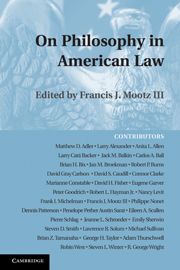Book contents
- Frontmatter
- Contents
- Introduction
- PART I KARL LLEWELLYN AND THE COURSE OF PHILOSOPHY IN AMERICAN LAW
- 1 On Philosophy in American Law (1934)
- 2 Law in Life, Life in Law: Llewellyn's Legal Realism Revisited
- 3 On Realism's Own “Hangover” of Natural Law Philosophy: Llewellyn Avec Dooyeweerd
- 4 On the Instrumental View of Law in American Legal Culture
- 5 When Things Went Terribly, Terribly Wrong
- 6 The Mechanics of Perfection: Philosophy, Theology, and the Foundations of American Law
- PART II PHILOSOPHICAL PERSPECTIVES ON LAW
- PART III AREAS OF PHILOSOPHY AND THEIR RELATIONSHIP TO LAW
- PART IV PHILOSOPHICAL EXAMINATIONS OF LEGAL ISSUES
- PART V LAW, RHETORIC, AND PRACTICE THEORY
- PART VI QUESTIONING THE RELATIONSHIP BETWEEN PHILOSOPHY AND AMERICAN LAW
- PART VII COMMENTARIES
- Contributors and Selected Bibliography
- Name Index
- References
4 - On the Instrumental View of Law in American Legal Culture
Published online by Cambridge University Press: 31 July 2009
- Frontmatter
- Contents
- Introduction
- PART I KARL LLEWELLYN AND THE COURSE OF PHILOSOPHY IN AMERICAN LAW
- 1 On Philosophy in American Law (1934)
- 2 Law in Life, Life in Law: Llewellyn's Legal Realism Revisited
- 3 On Realism's Own “Hangover” of Natural Law Philosophy: Llewellyn Avec Dooyeweerd
- 4 On the Instrumental View of Law in American Legal Culture
- 5 When Things Went Terribly, Terribly Wrong
- 6 The Mechanics of Perfection: Philosophy, Theology, and the Foundations of American Law
- PART II PHILOSOPHICAL PERSPECTIVES ON LAW
- PART III AREAS OF PHILOSOPHY AND THEIR RELATIONSHIP TO LAW
- PART IV PHILOSOPHICAL EXAMINATIONS OF LEGAL ISSUES
- PART V LAW, RHETORIC, AND PRACTICE THEORY
- PART VI QUESTIONING THE RELATIONSHIP BETWEEN PHILOSOPHY AND AMERICAN LAW
- PART VII COMMENTARIES
- Contributors and Selected Bibliography
- Name Index
- References
Summary
Karl Llewellyn's “On Philosophy in American Law” was not a philosophical essay but rather a chronological survey of the impact of philosophical ideas about law in American legal culture since the founding. Llewellyn (1934: 206) made this clear at the outset of his essay: “Thus what is here before the telescope is the changing array not of verbalized philosophies, but of philosophies-in-action as the history of law in these United States has gone its way. What those philosophies were, what needs they served – and whose. I am not so much concerned with the philosophers themselves, with whom indeed my acquaintance is but scanty. I am concerned with philosophy-in-action, with implicit philosophy, with those premises, albeit inarticulate and in fact unthought, which yet make coherence out of a multiplicity of single ways of doing.” It is important to consider the impact of philosophical ideas in this sense, Llewellyn wrote, because “once a philosophy has been established in the habits and attitudes of any person, it has effects” (Llewellyn 1934: 206).
An underlying theme of Llewellyn's survey is that philosophical ideas have time and again been enlisted in law to serve the powers that be. His sketch can be conveyed in a few strokes. Matters started off well enough at the founding and for several subsequent generations, Llewellyn suggests, during which judging was infused with ideas about natural law and right reason.
- Type
- Chapter
- Information
- On Philosophy in American Law , pp. 27 - 34Publisher: Cambridge University PressPrint publication year: 2009
References
- 2
- Cited by



